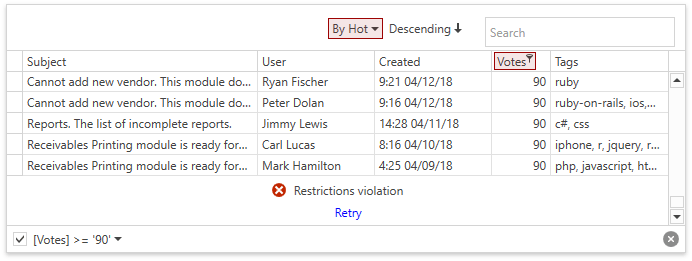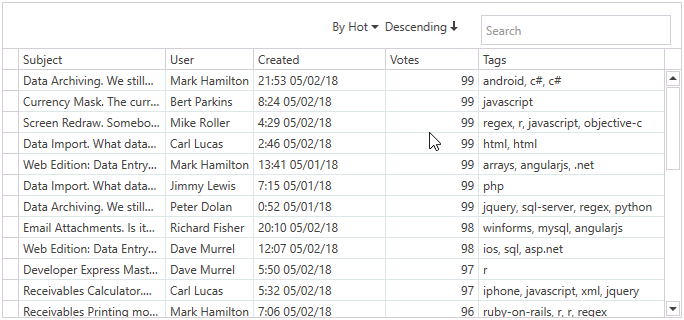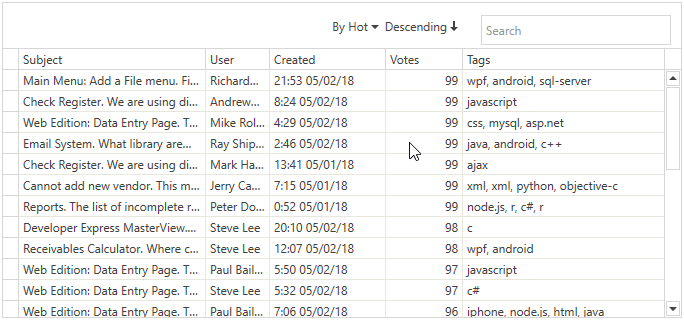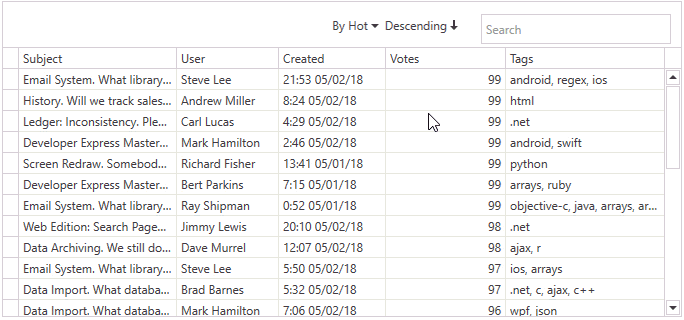Step 5: Consider Sort and Filter Restrictions
- 3 minutes to read
If you have successfully completed the preceding steps, the GridControl‘s UI allows end-users to perform data management operations. The Issues Service, however, has the certain sort and filter restrictions:
- Hot and Week sort orders can be filtered by Tags only.
- You can filter by Votes only after sorting by Votes.
Note
The Issues Service is used as an example of a data source in this tutorial.
An error occurs if you make a request that violates the restrictions above:
static void CheckRestrictions(IssueSortOrder sortOrder, IssueFilter filter) {
if(filter == null)
return;
if((sortOrder == IssueSortOrder.Hot || sortOrder == IssueSortOrder.Week)
&& (filter.CreatedFrom != null || filter.CreatedTo != null || filter.MaxVotes != null || filter.MinVotes != null))
throw new InvalidOperationException("Restrictions violation");
if((filter.MaxVotes != null || filter.MinVotes != null)
&& !(sortOrder == IssueSortOrder.VotesAscending || sortOrder == IssueSortOrder.VotesDescending))
throw new InvalidOperationException("Restrictions violation");
}
The following image shows an error that occurs if you apply a filter by Votes that is incompatible with the Hot sort order:

To not show such error messages, make the GridControl discard operations restricted by the data service. This topic explains how to do it.
Consider Sort and Filter Restrictions
Create a function that implements the service’s restrictions and determines whether sort and filter operations are compatible:
static bool IsValidFilter(string filterProperty, string sortProperty) { if(filterProperty == "Tags") return true; if(sortProperty == "Hot" || sortProperty == "Week") return false; if(filterProperty == "Votes" && sortProperty != "Votes") return false; return true; }Handle the DataControlBase.FilterGroupSortChanging event to discard filters that are incompatible with sorting:
void OnFilterGroupSortChanging(object sender, FilterGroupSortChangingEventArgs e) { // ... var sortProperty = e.SortInfo.SingleOrDefault()?.PropertyName; var invalidFilters = e.SplitColumnFilters.Keys .Where(key => !IsValidFilter(key, sortProperty)) .ToArray(); foreach(var invalidFilter in invalidFilters) e.SplitColumnFilters.Remove(invalidFilter); }Example 1
A filter by Votes is discarded if you perform the following steps:
- Sort by Votes
- Filter by Votes
- Sort by Created

This example shows that changing a sort mode discards incompatible filters.
Example 2
A filter by Votes is discarded if you perform the following steps:
- Sort by Created
- Filter by Votes

In this example, applying a filter by Votes makes no sense (the Issues Service can filter by Votes only after sorting by Votes). Follow the next step to prohibit such actions.
Prohibit end users from applying filters that violate the Issues Service‘s restrictions:
<dxg:GridColumn FieldName="Created" AllowColumnFiltering="{DXBinding '$dxu:DefaultBooleanExtension.ToDefaultBoolean(!@e(hotColumn).IsSorted and !@e(weekColumn).IsSorted)'}" /> <dxg:GridColumn FieldName="Votes" AllowColumnFiltering="{DXBinding '$dxu:DefaultBooleanExtension.ToDefaultBoolean(@Self.IsSorted)'}" />The image below shows the result:

Continue or Review
- To go to the next tutorial, see How to Bind to IQueryable.
- To return to the previous tutorial step, see Step 4: Enable Search Panel.